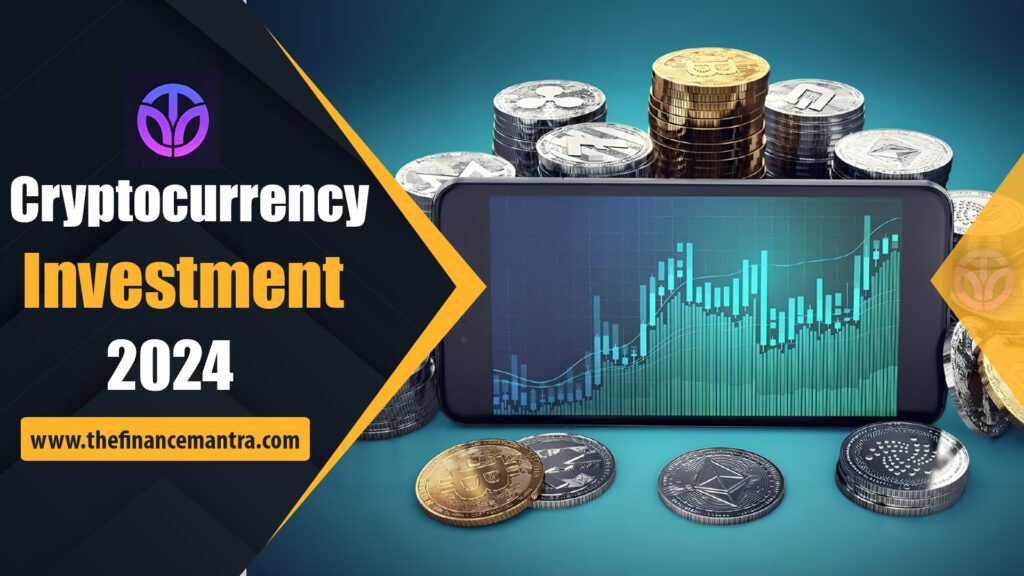Cryptocurrency Investment: As we head into 2024, the cryptocurrency world continues to rapidly evolve, offering both seasoned investors and newcomers endless opportunities to grow their portfolios. This article will explore some of the most promising cryptocurrency investment ideas for 2024, emphasizing simplicity and practical tips to help you make informed decisions.
Understanding the Cryptocurrency Landscape
Cryptocurrency Investment: Before we dive into specific investment ideas, it is essential to have a basic understanding of the current cryptocurrency landscape. Cryptocurrencies are digital or virtual currencies that use cryptography as a security measure. They are decentralized, meaning they operate without a central authority, such as a bank or government. This decentralization presents opportunities and risks, so it is essential to stay informed and pay attention.

Key Factors to Consider
Cryptocurrency Investment: When evaluating cryptocurrency investment opportunities, consider the following factors:
- Market Capitalization: This refers to the total value of a cryptocurrency, calculated by multiplying its current price by its total supply. Higher market cap often indicates stability.
- Technology: The underlying technology and its potential applications can significantly impact a cryptocurrency’s value.
- Adoption and Use Case: The more a cryptocurrency is used in real-world applications, the higher its potential value.
- Team and Community: A strong development team and an active, supportive community can drive a cryptocurrency’s success.
- Regulation: Regulatory developments can significantly impact the cryptocurrency market, either positively or negatively.
Top Cryptocurrency Investment Ideas for 2024
1. Bitcoin (BTC)
Why Invest: Bitcoin remains the pioneer and most widely recognized cryptocurrency. It’s often referred to as “digital gold” due to its store of value properties. Despite its volatility, Bitcoin has shown a consistent upward trajectory over the years, making it a cornerstone of many investment portfolios.
Key Points:
- Market Leadership: Bitcoin continues to lead the market in terms of market cap and recognition.
- Institutional Adoption: Increasing institutional interest and investment in Bitcoin, such as from major companies and financial institutions, adds to its credibility.
- Limited Supply: With a capped supply of 21 million coins, Bitcoin’s scarcity can drive its value over time.
2. Ethereum (ETH)
Why Invest: Ethereum is more than just a cryptocurrency; it’s a platform for decentralized applications (dApps) and smart contracts. Its versatility and continuous upgrades, like the transition to Ethereum 2.0, make it a compelling investment.
Key Points:
- Smart Contracts: Ethereum’s ability to execute smart contracts makes it the backbone of decentralized finance (DeFi) and many blockchain projects.
- Ethereum 2.0: The upgrade aims to improve scalability, security, and energy efficiency, potentially driving more adoption and investment.
- Developer Community: Ethereum has one of the largest and most active developer communities, continuously innovating and expanding its ecosystem.
3. Cardano (ADA)
Why Invest: Cardano is a third-generation blockchain platform known for its scientific approach and peer-reviewed research. It aims to solve the scalability and sustainability issues faced by earlier blockchains.
Key Points:
- Proof-of-Stake: Cardano uses a proof-of-stake consensus mechanism, which is more energy-efficient than Bitcoin’s proof-of-work.
- Research-Driven: The platform is built on rigorous academic research, contributing to its robustness and security.
- Growing Ecosystem: With a focus on decentralized applications and partnerships, Cardano’s ecosystem is expanding rapidly.
4. Solana (SOL)
Why Invest: Solana is known for its high-speed and low-cost transactions, making it an attractive option for developers and users. Its rapid growth and increasing adoption in the DeFi and NFT spaces make it a noteworthy contender.
Key Points:
- Scalability: Solana can process thousands of transactions per second, making it one of the fastest blockchains.
- Low Fees: The platform offers minimal transaction fees, appealing to both developers and users.
- DeFi and NFTs: Solana has gained traction in the DeFi and NFT markets, with numerous projects building on its platform.
5. Polkadot (DOT)
Why Invest: Polkadot aims to create a network of interconnected blockchains, enabling them to communicate and share information seamlessly. This interoperability can drive significant innovation and adoption.
Key Points:
- Interoperability: Polkadot’s ability to connect multiple blockchains can enhance efficiency and collaboration across various platforms.
- Strong Development Team: The project is led by Gavin Wood, a co-founder of Ethereum, adding credibility and expertise.
- Parachains: Polkadot’s unique parachain model allows for specialized blockchains to run alongside the main chain, improving scalability and functionality.
6. Chainlink (LINK)
Why Invest: Chainlink is a decentralized oracle network that connects smart contracts with real-world data. Its role as a bridge between blockchain and external data sources is crucial for many decentralized applications.
Key Points:
- Oracle Solutions: Chainlink’s oracles are essential for smart contracts that require external data, such as financial data and weather information.
- Partnerships: Chainlink has established numerous partnerships across various industries, enhancing its credibility and adoption.
- Growing Ecosystem: As more projects integrate Chainlink’s oracles, its utility and demand are likely to increase.
7. Avalanche (AVAX)
Why Invest: Avalanche is a high-performance blockchain platform designed for decentralized applications and enterprise solutions. Its focus on speed, low costs, and eco-friendliness makes it a compelling investment.
Key Points:
- High Throughput: Avalanche can process thousands of transactions per second, making it one of the fastest blockchains available.
- Subnets: The platform’s subnet architecture allows for the creation of custom blockchains, enhancing flexibility and scalability.
- Growing Adoption: Avalanche is gaining traction in the DeFi space, with numerous projects choosing its platform for development.
Emerging Trends in Cryptocurrency Investment
1. Decentralized Finance (DeFi)
Overview: DeFi represents a broad category of financial applications built on blockchain technology. These applications aim to recreate traditional financial systems, such as lending, borrowing, and trading, in a decentralized manner.
Investment Opportunities:
- DeFi Tokens: Tokens associated with DeFi platforms, such as Uniswap (UNI), Aave (AAVE), and Compound (COMP), offer significant growth potential.
- Yield Farming: Investors can earn rewards by providing liquidity to DeFi platforms, although this comes with risks.
2. Non-Fungible Tokens (NFTs)
Overview: NFTs are unique digital assets that represent ownership of a specific item or piece of content, such as art, music, or virtual real estate. The NFT market has exploded in recent years, offering lucrative opportunities for investors.
Investment Opportunities:
- Art and Collectibles: Investing in digital art and collectibles can yield substantial returns, especially if the pieces gain popularity.
- Gaming: NFTs are increasingly used in gaming, where players can buy, sell, and trade in-game assets.
- Virtual Real Estate: Platforms like Decentraland and The Sandbox allow users to invest in virtual land and properties.
3. Layer 2 Solutions
Overview: Layer 2 solutions aim to improve the scalability and efficiency of existing blockchain networks by processing transactions off the main chain.
Investment Opportunities:
- Polygon (MATIC): A leading Layer 2 solution for Ethereum, offering faster and cheaper transactions.
- Arbitrum: Another Layer 2 solution gaining traction, focusing on improving Ethereum’s scalability.
- Optimism: A project designed to enhance the performance of Ethereum by reducing congestion and lowering fees.
Tips for Successful Cryptocurrency Investment
- Do Your Research: Thoroughly research any cryptocurrency before investing. Understand its technology, use case, team, and community.
- Diversify Your Portfolio: Spread your investments across multiple cryptocurrencies to mitigate risk.
- Stay Informed: Keep up with the latest news and developments in the cryptocurrency space. Regulatory changes, technological advancements, and market trends can all impact your investments.
- Use Reputable Exchanges: Only trade on reputable cryptocurrency exchanges to ensure the security of your funds.
- Consider Long-Term Potential: While short-term trading can be profitable, consider the long-term potential of your investments. Many cryptocurrencies offer substantial growth over time.
Conclusion
Cryptocurrency Investment: Investing in cryptocurrency in 2024 represents a dynamic and potentially profitable opportunity. By understanding the key factors that influence the market and exploring promising investment ideas, you will be able to make informed decisions that suit your financial goals. Remember to stay informed, diversify your portfolio, and approach your investments with caution. The world of cryptocurrencies is constantly evolving, and with the right strategies, you can navigate it successfully and earn significant profits.
FAQs: Cryptocurrency Investment Ideas 2024
1. What is cryptocurrency?
Answer: Cryptocurrency is a digital or virtual currency that uses cryptography for security. It operates on decentralized networks based on blockchain technology, making it independent of central authorities like governments or banks. (Cryptocurrency Investment)
2. Why should I consider investing in cryptocurrencies in 2024?
Answer: Cryptocurrencies offer high potential returns, diversification of investment portfolios, and access to innovative financial technologies. The growing adoption of blockchain technology and digital currencies in various industries also presents significant opportunities.
3. What are the risks associated with cryptocurrency investments?
Answer: Cryptocurrency investments are volatile and can experience significant price swings. Other risks include regulatory changes, technological vulnerabilities, security breaches, and market manipulation.
4. How do I start investing in cryptocurrencies?
Answer: To start investing in cryptocurrencies:
- Choose a reputable exchange: Platforms like Coinbase, Binance, and Kraken are popular choices.
- Create an account: Sign up and complete any necessary verification processes.
- Fund your account: Deposit funds via bank transfer, credit card, or other payment methods.
- Buy cryptocurrencies: Select the cryptocurrencies you want to invest in and make your purchase.
5. What is Bitcoin (BTC)?
Answer: Bitcoin is the first and most well-known cryptocurrency, often referred to as “digital gold.” It serves as a store of value and a medium of exchange, with a fixed supply of 21 million coins.
6. What is Ethereum (ETH)?
Answer: Ethereum is a decentralized platform that enables smart contracts and decentralized applications (dApps). Its cryptocurrency, Ether (ETH), is used to power these applications and pay for transaction fees on the network.
7. What are altcoins?
Answer: Altcoins are any cryptocurrencies other than Bitcoin. They include a wide variety of coins and tokens with different use cases and technologies, such as Ethereum, Cardano, Solana, and Polkadot.
8. What is DeFi (Decentralized Finance)?
Answer: DeFi refers to a broad category of financial applications built on blockchain technology that aims to recreate traditional financial systems like lending, borrowing, and trading in a decentralized manner.
9. What are NFTs (Non-Fungible Tokens)?
Answer: NFTs are unique digital assets that represent ownership of a specific item or piece of content, such as digital art, music, or virtual real estate. Each NFT is one-of-a-kind and cannot be exchanged on a one-to-one basis like cryptocurrencies.
10. What are Layer 2 solutions?
Answer: Layer 2 solutions are technologies designed to improve the scalability and efficiency of existing blockchain networks by processing transactions off the main chain. Examples include Polygon (MATIC), Arbitrum, and Optimism.
11. How can I keep my cryptocurrency investments safe?
Answer: To keep your investments safe:
- Use reputable exchanges: Choose well-established platforms with strong security measures.
- Enable two-factor authentication (2FA): Add an extra layer of security to your accounts.
- Use hardware wallets: Store your cryptocurrencies in offline hardware wallets to protect them from online threats.
- Stay vigilant: Be aware of phishing scams and fraudulent schemes.
12. What is a hardware wallet?
Answer: A hardware wallet is a physical device that securely stores the private keys to your cryptocurrencies offline. Popular options include Ledger Nano S, Ledger Nano X, and Trezor.
13. How do I diversify my cryptocurrency portfolio?
Answer: Diversify by investing in a variety of cryptocurrencies with different use cases, technologies, and market capitalizations. This approach can help mitigate risk and increase potential returns.
14. What are the tax implications of cryptocurrency investments?
Answer: Tax regulations for cryptocurrencies vary by country. In many places, cryptocurrencies are treated as property or assets, and you may be required to pay capital gains tax on profits. Consult a tax professional to understand your obligations.
15. What should I consider when choosing a cryptocurrency to invest in?
Answer: Consider factors like market capitalization, technology, adoption and use cases, the development team, and community support. Also, stay informed about regulatory developments and market trends.
16. What is a smart contract?
Answer: A smart contract is a self-executing contract with the terms of the agreement directly written into code. It automatically executes and enforces the terms when certain conditions are met, without the need for intermediaries.
17. How does blockchain technology work?
Answer: Blockchain is a decentralized, distributed ledger that records transactions across multiple computers. Each block contains a list of transactions, and these blocks are linked together to form a chain. This technology ensures transparency, security, and immutability of data.
18. What is a cryptocurrency wallet?
Answer: A cryptocurrency wallet is a digital tool that allows you to store, send, and receive cryptocurrencies. Wallets can be software-based (online or mobile apps) or hardware-based (physical devices).
19. What are gas fees?
Answer: Gas fees are transaction fees paid to miners or validators to process and confirm transactions on a blockchain network. On Ethereum, gas fees are used to compensate for the computational resources required to execute smart contracts and transactions.
20. How can I stay updated on cryptocurrency news and trends?
Answer: Stay informed by following reputable cryptocurrency news websites, joining online communities (such as Reddit and Twitter), and subscribing to newsletters from industry experts. Regularly check for updates from the development teams of the cryptocurrencies you invest in.


